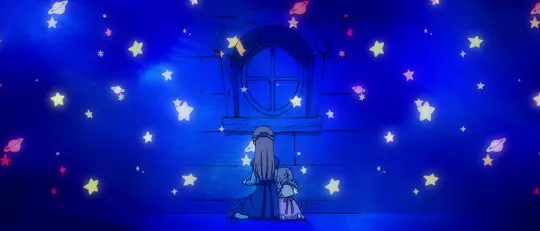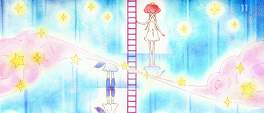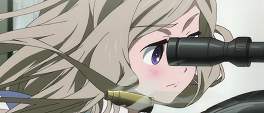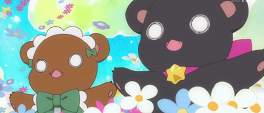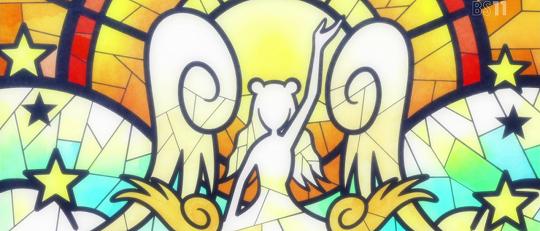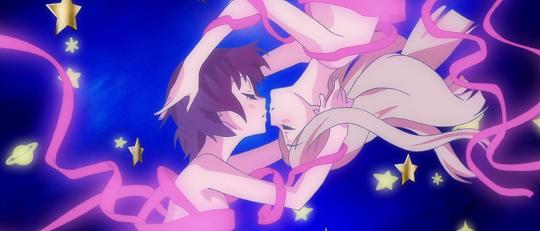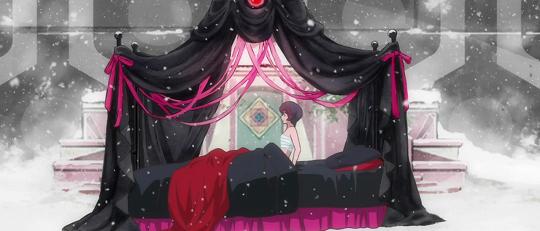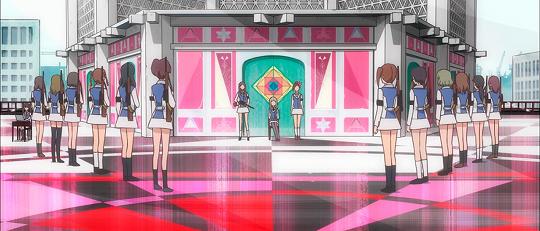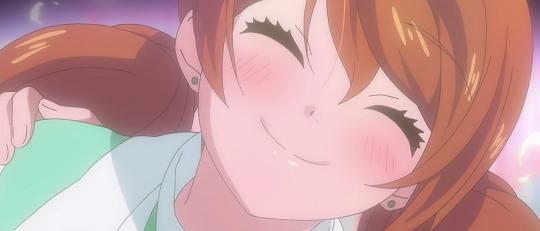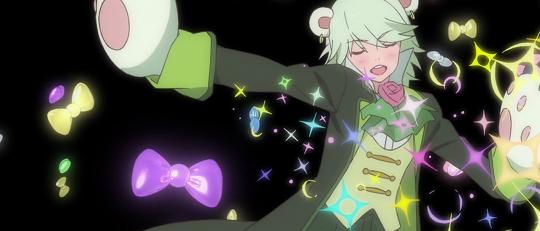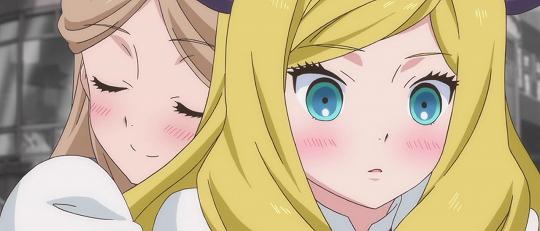Lesbian Bear Storm (Yurikuma Arashi). Let that title sink in for a bit because as titles go, it’s particularly on the nose. Especially so for director and writer Kunihiko Ikuhara whose previous directorial works - Utena and Penguindrum - relied on a slightly less blatant approach to themes and tone.
Blunt force is the order of the day here though because from the repeated character refrains through to the imagery and structure of each episode, this is a series that will bludgeon you with its message rather than hide it subtext and inference. What it lacks in subtlety then, as has become a trait of the director’s anime series, it makes up for in layers and symbolism.
Where to start though? The story of the bears Lulu and Ginko crossing over the ominously titled “Wall of Severance” to meet the human Kureha and exchange a “Promise Kiss” is already oblique enough. So that title. Although the “Yuri” of Yurikuma Arashi is otaku vernacular for the women-who-love-women genre of manga and anime, translating it directly to “lesbian” is hamfisted at best, and like many Japanese terms loses a lot of the nuance in doing so. That becomes important because although the series deals with common yuri imagery - lilies being the main one - there is little overt sexual interaction between the almost entirely female cast, more sapphic than smut then. Especially so when you compare it to the straightforward displays of affection that something like Sakura Trick thrived on.
The yuri here then is, apart from the series’ climactic scene, implicit rather than explicit and entangled in the different thematic threads that run throughout. The most overt ties-in to the “storm” part of the title, or to give its full name: the “Invisible Storm” (in the Funimation simulcast subtitles at least). It’s a term that’s bandied around by the students of the all-girl Arashigaoka Academy, yet very little is tangibly known about it. It’s definitely metaphorical and abstract in nature and is most commonly uttered when one of the ominous “exclusion ceremonies” is taking place - that’s when all the girls choose whom to ostracise: a fate akin to death or so we’re told.
Social expulsion is arguably the key driving force of the plot: you don’t adhere to our way of thinking so we’ll exclude you from the group. In western school systems this would be the silent treatment or, well, actual social exclusion, yet in Japan it’s difficult not to see this in terms of a society that has the well documented focus on group unity, where not being part of the group is traditionally very traumatic. How are people excluded though? Mobile phones of course. Petty, petty children.
Why are people excluded? That’s a bit more involved. At the start of the story Kureha and her friend Sumika are excluded for showing perhaps a bit too much affection for one another. Homosexuality being a cause for ostracisation? Never! As subtext goes it’s as blatant as it comes and as the viewer you are repeatedly reminded more often than is necessary; however it represents only the visible part of this Ikuhara iceberg, which is where the bears come in.
From the first few episodes we are led to believe that the human society - where Kureha, Sumika and the school is set - is under threat from constant bear incursion. Garish warnings unspool themselves while loudspeakers belt out instructions to arm oneselves (bear arms?) against the not so clear and present menace. Except of course the bears that we see are not five hundred pounds of fur and claw, they’re barely more visually threatening than teddy bears and, adorably enough, of a similar stature. Even Lala from Knights of Sidonia managed to cast a more threatening visage. Yet, as the story progresses we find out that the lands outside the human city is a veritable kingdom of bears, royalty and all. But more pertinently, that the bears hide amongst the humans. Dressed as humans. Talking like humans. Eating humans.
So not only does Kureha have to be careful that her forbidden love isn't revealed, branding her a pariah, but also of bears lurking within the school. Bears that took the life of her mother and, eventually, take the life of Sumika as well, posing the the question the series’ chooses to leave you with: can two different species, bears and humans, allegorical or otherwise, co-exist and even love one another without prejudice?
It’s here then that analysis turns to speculation because it’s one thing to say that the bears are a representation of masculinity or of homosexual acceptance, or that the judgement by the only male characters in the series could represent the otaku “gaze”, but it’s another thing to claim these are the only interpretations.
It’s easier to start with the visuals because while in inimitable Ikuhara style, they share a deep connection with both Utena and Penguindrum, eagle eyed viewers twigged that a lot of the imagery shares traits with Hitchcock’s Psycho and Argento’s Suspiria, both highly influential and, most importantly, atypical horror films. The former’s influence seems mostly cosmetic with Kureha’s house bearing uncanny resemblances, but when combined the influence of the latter, the series’ narrative and themes become far more pronounced.
Like Suspiria, Yurikuma is set in an all-girls school where members of staff and the student body turn out to be… something other than human. It’s a common enough horror setup: subverting the everyday and that which you trust. Again, like Suspiria, generations of women are transformed into aggressors from the kindly mentor to the supposedly understanding friends, it turns the intimate into the horrific, in this case into flesh-eating bears and steadily isolates the protagonist, in this case Kureha.
Is Yurikuma Arashi Ikuhara’s take on horror then? Horror is often as much about desire as it is violence in which case Yurikuma measures up: Ginko’s desire to meet up with Kureha separates her from her kin (exclusion) and pushes her through war and bloodshed, just as Kureha’s desire to avenge her mother’s death turns into the desire to have love, to not be forgotten, to not be invisible. It’s the desire to conform the breeds backbiting and petty jealousy or her classmates, but also to love and it’s that desire which can be blinding, forcing you to kill or worse, to forget.
Where Yurikuma really cribs from Suspiria though, and where Ikuhara’s deep understanding of that film and the horror genre as a whole peeks through, is in how the story of Ginko, Lulu and Kureha is told. The most immediately obvious aspect is that it’s not told even close to linearly, hurtling into flashbacks within flashbacks with little concern for pacing, before cutting to different viewpoints or even jumping back into the pastel fairytale storybook left by Kureha’s mother. The narrative deals with an absent god, ethereal judges and implausible spaces. Like a fever dream all the colours and oblique angles and impossible topography of the world swirl together with only a maddening poetic consistency to keep it together. More than anything the visuals, stark reds and watercolours, shattered mirrors and glass steps are sensorial, they’re about atmosphere: felt viscerally rather than explicitly understood. Like the storybook then, Yurikuma as a whole is somewhere between a fairytale and a hallucination - how else would you explain how a person wearing fluffy bear paws and ears can elicit such horror in people? It is, simply, utterly absurd and it’s within that absurdity that it hides its social messages - Kureha’s handcuffs breaking as soon as she admits to her love, the love that would have her excluded, is one of the most blatant examples.
That’s not to say of course that the series as a whole works, or that as one potential reading, it earns a pass because of attempted intellectualism. The constant repetition of ideas in the early episodes protracts them unduly and if it wasn’t for the often deliriously beautiful visuals (Silver Link again proving their mettle) and general manic lunacy going on - Kuma Shock! - those episodes would be dealbreakers. Similarly the “poetry over prose” approach to storytelling is undoubtedly distinctive and something that Ikuhara leaned strongly towards in Penguindrum, however it does make it punishingly difficult not only to follow but to appreciate on an episode by episode basis. Likewise the constant flashbacks start to wear thin, especially when plot points - letters, photos and books oh my! - drop out of them like splinters with little care for foreshadowing.
There is a huge amount going on with Yurikuma Arashi. Everything from the bird/lily optical illusion through to the subplot of Yuriika and her boxes contributing to what is a stark, gorgeous and often affecting series but one that isn’t without contention. In its quieter moments like when Lulu is making food, the story is able to catch its breath and non-sequiturs like zombie cyborg bears ebb away, alleviating the noise of the rest of the series. The story as a whole largely operates on an emotional level able to sucker punch you just as much as it is to summon gleeful tears, and though mostly high-minded it isn’t above stooping to straightforward flesh-peddling, tainting the angelic, virginal innocence its characters tout when talking about love. Enjoyable, but an acquired taste.
